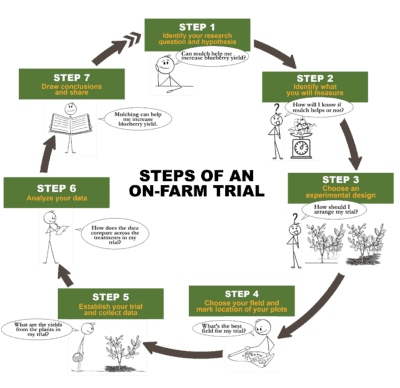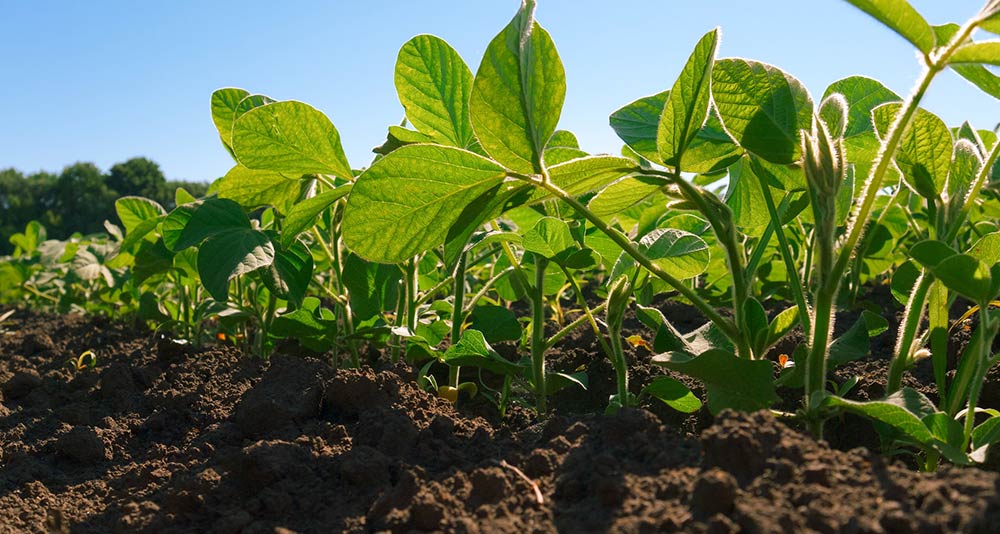Before You Apply
As part of the technical assistance support, OFRF is excited to share our Farmers Guide to Conducting On-Farm Research (versión en español aquí), which we encourage all applicants to read prior to submitting a proposal. We have also made a recording available of the Program Info Session.
If you’re interested in applying to OFRF’s Farmer Led Trials Program, please familiarize yourself with these resources and read through the information on this page.
If you have questions about your eligibility or application, please contact OFRF’s Research & Education Program Manager, Mary Hathaway at mary[at]ofrf.org.
Program Details
Support From OFRF
Throughout the on-farm trial process, OFRF will provide technical assistance to help farmer-researchers refine their research questions, design their experiments, identify data collection protocols, analyze data, and present their findings. See the FAQ section below for more information. As part of the technical assistance support, OFRF is excited to share our Farmers Guide to Conducting On-Farm Research, which we encourage all applicants to read prior to submitting a proposal.
Additionally, farmer-researchers will receive support for supplies, small equipment, data collection tools, testing, or labor.
Farmer-Researcher Commitment
Program participants are expected to:
- Work closely with OFRF staff for the entire duration of the project, to refine research questions, design the trials, provide regular updates to OFRF, and share data and findings.
- Work with OFRF to develop and follow a project timeline that will contain all the important dates and activities throughout the trial.
- Regularly collect data and record findings for the project.
- Take photos that depict the differences and observations among the treatments/trials and other relevant photos throughout the project.
- Agree to share their trial results openly. This may include: blog posts, pictures, webinar/video presentations, or other shareable media.
- Help complete a final finding report and share project results via webinar and/or Farmer-Researcher Forum. OFRF will give dates and support for all project presentations.
Topic Areas
Priority topics for trial proposals include, but are not limited to the following areas:
- Weed suppression
- Maintaining or improving yields
- Soil health
- Cover crops
- Insect pest suppression
- Disease suppression
- Organic crop variety and seed trials
- Organic livestock breeds and management
Eligibility
- Eligible participants include any farmer or rancher in the U.S. or its territories who are relatively new to conducting on-farm research and are seeking to build confidence in their research skills.
- Eligible farms produce food or fiber for sale. The program is not designed for farms that are a part of research institutions.
- Farms must be certified organic or in transition to organic.
- Participants must have management abilities, lease, or ownership of the farm where trials are to occur.
Applying
Applications for the 2026 cohort are now closed. Sign up to receive notifications when our application window opens again in fall 2027.
The advisory committee will review proposals and notify successful applicants in February 2026. Farmer agreements will be signed prior to the start of the trial and the disbursement of support. Those who are not selected for trials are encouraged to flesh out ideas based on the feedback received from the committee so they can apply again next year.
A strong application will emphasize the importance of a “good question” – something that is measurable, achievable, and will help the farmer answer a production challenge and learn more about conducting research on their farm. Farmers will be asked to describe their potential project through straightforward questions about their motivation, potential practices to test, measurements of interest, space available, potential challenges, other considerations, and how their trial fits the research priorities identified by OFRF.
You can view the rubric form that reviewers use to evaluate your proposal. For inspiration, other examples of on-farm research can be found on Appendix 4 of OFRF’s Farmers Guide to Conducting On-Farm Research.
For more information, we encourage you to watch the 2024 FLT Program Forum and familiarize yourself with the Farmers Guide to Conducting On-Farm Research before you apply. If you have questions about your eligibility or application, please contact OFRF’s Research & Education Program Manager, Mary Hathaway at mary[at]ofrf.org.




